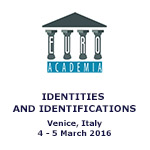Euroacademia Conferences
 Europe Inside-Out: Europe and Europeanness Exposed to Plural Observers (9th Edition) April 24 - 25, 2020
Europe Inside-Out: Europe and Europeanness Exposed to Plural Observers (9th Edition) April 24 - 25, 2020 Identities and Identifications: Politicized Uses of Collective Identities (9th Edition) June 12 - 13, 2020
Identities and Identifications: Politicized Uses of Collective Identities (9th Edition) June 12 - 13, 2020 8th Forum of Critical Studies: Asking Big Questions Again January 24 - 25, 2020
8th Forum of Critical Studies: Asking Big Questions Again January 24 - 25, 2020 Re-Inventing Eastern Europe (7th Edition) December 13 - 14, 2019
Re-Inventing Eastern Europe (7th Edition) December 13 - 14, 2019 The European Union and the Politicization of Europe (8th Edition) October 25 - 26, 2019
The European Union and the Politicization of Europe (8th Edition) October 25 - 26, 2019 Identities and Identifications: Politicized Uses of Collective Identities (8th Edition) June 28 - 29, 2019
Identities and Identifications: Politicized Uses of Collective Identities (8th Edition) June 28 - 29, 2019 The European Union and the Politicization of Europe (7th Edition) January 25 - 26, 2019
The European Union and the Politicization of Europe (7th Edition) January 25 - 26, 2019 7th Forum of Critical Studies: Asking Big Questions Again November 23 - 24, 2018
7th Forum of Critical Studies: Asking Big Questions Again November 23 - 24, 2018 Europe Inside-Out: Europe and Europeanness Exposed to Plural Observers (8th Edition) September 28 - 30, 2018
Europe Inside-Out: Europe and Europeanness Exposed to Plural Observers (8th Edition) September 28 - 30, 2018 Identities and Identifications: Politicized Uses of Collective Identities (7th Edition) June 14 - 15, 2018
Identities and Identifications: Politicized Uses of Collective Identities (7th Edition) June 14 - 15, 2018
Defamiliarizing the Familiar and Moving the Immovable: Exile, Return, and the Journey in Ḥussein Barghoutī’s The Blue Light, and I Will Be Among the Almond Trees
-
-

-
Presentation speakers
- Haneen Omari, Institute for Area Studies, Leiden University, The Netherlands
Abstract:
The two dimensions of spatiality and temporality play a focal role in modern Palestinian literature: many poems, stories and novels revolve around what Palestine, as a land, became to mean to the Palestinian individual and community. This paper aims to show how the modern Palestinian author, Ḥussein Barghoutī, provides new definitions of the notions of exile, return, and journey that go beyond their traditional definitions in the Palestinian literary context. The focus will be on Barghoutī’s two autobiographical works The Blue Light, and I Will Be Among the Almond Trees, which will be read in tandem with some of his critical and theoretical notions. Through the invocation of concepts like the embroidered time, defamiliarization, and movement, Barghoutī provides a look on the interplay between the past and the present, and the ways in which the individual’s identity is moulded in relation to society, place, and time. Barghoutī’s aim is to highlight that political, social, and historical aspects should not be perceived as controlling factors that define the identity of Palestinian literature and life but rather as elements that contribute to the fluidity and changeability of this multi-dimensional identity. Thus, instead of saying that Barghoutī writes outside the canon of modern Palestinian literature, it will be argued that Barghoutī’s work widens the body of Palestinian literature and offers new insights about Palestinian life and identity.
-
Related Presentations

Crossroads and Identities: Contemporary Canadian Women Writing Displacement
- Magali Sperling Beck













